新课标话题项目表18137
2017版新课标话题表
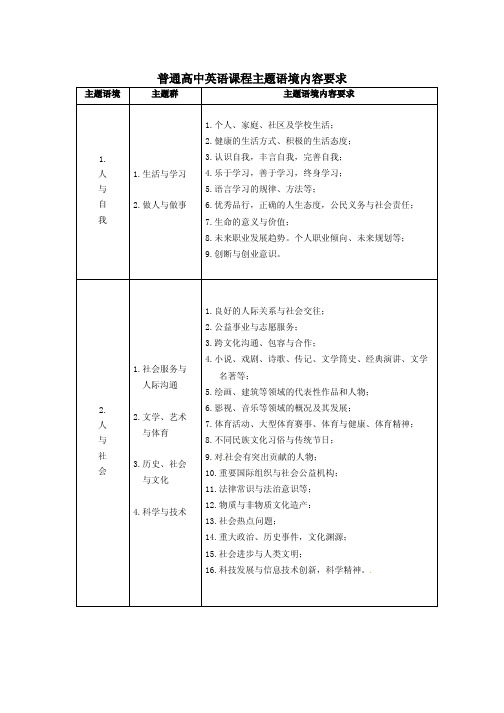
主题语境 主题群 主题语境内容要求
1. 个人、家庭、社区及学校生活; 2. 健康的生活方式、积极的生活态度; 1. 人 与 自 我 2. 做人与做事 1. 生活与学习 3. 认识自我,丰言自我,完善自我; 4. 乐于学习,善于学习,终身学习; 5. 语言学习的规律、方法等; 6. 优秀品行,正确的人生态度,公民义务与社会责任; 7. 生命的意义与价值; 8. 未来职业发展趋势。个人职业倾向、未来规划等; 9. 创断与创业意识。
[
1. 良好的人际关系与社会交往; 2. 公益事业与志愿服务; 3. 跨文化沟通、包容与合作; 1. 社会服务与 人际沟通 2. 人 与 社 会 4. 小说、戏剧、诗歌、传记、文学筒史、经典演讲、文学 名著等; 5. 绘画、建筑等领域的代表性作品和人物; 6. 影视、音乐等领域的概况及其发展; 7. 体育活动、大型体育赛事、体育与健康、体育精神; 8. 不同民族文化习俗与传统节日; 9. 对 社会有突出贡献的人物; 10. 重要国际组织与社会公益机构; 11. 法律常识与法治意识等; 12. 物质与非物质文化造产: 13. 社会热点问题; 14. 重大政治、历史事件,文化渊源; 15. 社会进步与人类文明; 16. 科技发展与信息技术创新,科学精神。
2. 文学、艺术 与体育
3. 历史、社会 与文化
பைடு நூலகம்
4. 科学与技术
1. 自然生态 3. 人 与 自 然 4. 宇宙探索 3. 灾害防范 2. 环境保护
1. 主要国家地理概况; 2. 自然环境、自然遗产保护; 3. 人与环境、人与 动植物; 4. 自然灾害与防范,安全常识与自我保护; 5. 人类生存、社会发展与环境的关系; 6. 自然科学研究成果; 7. 地球与宇宙奥秘探索。 (源自2017版课标第14-15页)
2023年初中英语话题项目表

2023年初中英语话题项目表一、引言随着全球化的推进,英语作为世界通用语言的重要性日益凸显。
在我国,英语教育已经成为教育体系中不可或缺的一部分。
尤其在初中阶段,英语学习更是至关重要,设计一份富有话题性、体现时代特点的英语项目表,有利于激发学生学习英语的兴趣,提高英语学习效果。
二、项目表具体内容1. 关于科技的话题- 网络安全- 人工智能- 科技对健康的影响- 未来科技发展2. 关于环保的话题- 塑料污染- 绿色能源- 垃圾分类- 环保公益活动3. 关于文化的话题- 传统节日- 中西文化差异- 流行文化- 文化遗产保护4. 关于教育的话题- 教育公平- 优质教育资源分配- 课外活动- 教育创新5. 关于健康的话题- 饮食健康- 运动习惯- 心理健康- 社会健康问题6. 关于社会现象的话题- 网络侵权- 社交媒体与人际关系- 青少年成长问题- 传媒对社会的影响三、项目表的制定原则和方法1. 充分考虑学生的实际情况和兴趣爱好,确保话题的时代性和接地气。
2. 以培养学生的批判性思维和创造力为目标,选择具有广泛讨论空间和深度挖掘潜力的话题。
3. 采用多种形式的活动设计,例如小组讨论、写作比赛、主题演讲等,以提高学生的综合语言运用能力。
四、项目表的实施与评估1. 实施阶段- 教师根据项目表的话题内容,组织相关课堂活动,如阅读、听力、口语练习等。
- 学生按照项目表的话题开展小组活动,展示团队合作能力和表达能力。
2. 评估阶段- 教师通过学生的表现、作业和项目展示等形式进行综合评估。
- 学生通过自评、互评和教师评价,形成对自己学习成果的客观认识。
五、项目表的实际效果分析1. 提高学生的学习积极性和主动性,培养学生的学习兴趣和学习动力。
2. 大大提高了学生的综合语言运用能力,增强了学生的口头表达和书面表达能力。
3. 培养学生的创新意识和批判性思维,提高学生的文化包容性和社会责任感。
六、结语制定一份富有话题性且符合时代特点的初中英语项目表,可以有效推动学生的英语学习,激发学生的学习兴趣和积极性,提高学生的英语综合能力,为学生的综合发展打下坚实的基础。
新课标24个新话题目录:奇速英语.pdf

新课标24个新话题目录-奇速英语1.Personal background2.Family, Friends and People Around3.Living Environment4.Daily Routines5.School6.Personal Interests7.Feelings and Moods8.Plans and Arrangements9.Festival, Holidays and Celebrations10.Shopping11.Food and Drinks12.Weather13.Interpersonal Communication14.Hygiene and Health15.Recreation and Sports16.Travel and Transport17.Naturenguage Learning19.The World and the Environment20.Safety and First aid21.Popular Science and Modern Technology22.History and Societymunication24.Stories and Poems中学英语课程标准24个话题项目说明:标*号的项目为八级要求。
1. 个人情况(Personal information)(1)Individual data (name, age, date of birth, place of birth, telephone number, address, postal code, e-mail address, ID number, etc. )(2)Family data (name, age, relatihip, etc. )(3)School data (school, grade, class, teacher, etc. )(4)Data uses (filling out forms and applicati, etc. )(5)Jobs and career (office worker, worker, teacher, doctor, farmer, driver, official, etc. )2. 家庭、朋友与周围的人(Family, friends and people around)(1)Family and relatives (grandparents, parents, brother, sister, aunt, uncle, cousin, son, daughter, etc. ))(2)Friends (close neighbour, schoolmate, classmate, roommate, team-mate, etc. (3)Other people (neighbour, local shopkeeper, teacher, colleague, etc. )3. 周围的环境(Personal environments)(1)Kinds of homes (apartment, house, dormitory, etc. )(2)Rooms in homes (bedroom, kitchen, living room, bathroom, etc. )(3)Furniture & home items (table, chair, sofa, desk, bed, television, etc. )(4)Schools (classroom, playground, hall, computer room, office, etc. )(5)Outside (grocery store, book shop, clothing store, market, bank, library, museum, cinema, theatre, park, road, etc. )4. 日常活动(Daily routines)(1)Getting ready (time for school, playing, bed)(2)Dressing, brushing teeth, washing hands and face, taking a shower, etc.(3)Eating (breakfast, lunch, snacks and dinner)(4)Daily chores (tidying, sweeping, doing dishes, cooking)(5)Homework (reading, writing, studying, etc. )(6)Family time (watching television, going out, visiting, etc. )5. 学校生活(School life)(1)School building (classroom, office, library, washroom, etc. )(2)School organization (grade, class, subject, break, schedule, etc. )(3)People (teacher, classmate, schoolmate, cleaner, etc. )(4)Subjects (Chinese, maths, English, geography, history, etc. )(5)Activities (sports, extra-curricular involvement, trip, etc. )(6)Instructi (Please listen, read, get into groups, act, etc. )(7)Educational methods (preview, review, discuss, presentation, summary)6. 兴趣与爱好(Interests and hobbies)(1)Less (music, dance, acting, sport, etc. )(2)Games (physical games, computer games, sports, etc. )(3)Hobbies (collecting stamps, coins, dolls, etc. )(4)Reading (books, newspapers, comics, etc. )(5)Cultural events (film, theatre, concert, opera, etc. )(6)Entertainment (listening to radio, watching TV, playing CD, DVD, etc. )(7)Socializing (having parties, issuing invitati, going for picnics, going sightseeing, entertaining guests, etc. )(8)Expressing your reacti to these activities7. 个人感情(Emoti)(1)Describing feelings (happy, sad, angry, upset, pleased, proud, lonely, worried, nervous, afraid, etc. )(2)Expressing emoti (smiling, laughing, crying, shouting, etc. )(3)Describing facial expressi and gestures8. 人际关系(Interpersonal relatihips)(1)People (parent, brother, sister, other family members, friend, neighbour, teacher, etc. )(2)Social behaviours (greeting, introducing, giving thanks, asking for permission, asking for help, solving problems, dealing with conflicts, etc. )(3)Getting together (making plans / arrangements, time, date, place, event, etc. )9. 计划与愿望(Plans and intenti)(1)Planning (holidays, social events, travel, further education, jobs, etc. )(2)Organising (asking for advice, asking for help, asking for permission,。
整理新课标功能意念与话题项目表

11互联网文化节策划方案
12拱墅新闻网建立制度
13净化网络空间
14制作正能量快闪视频策划方案
整理丨尼克
本文档信息来自于网络,如您发现内容不准确或不完善,欢迎您联系我修正;如您发现内容涉嫌侵权,请与我们联系,我们将按照相关法律规定及时处理。
1社区文化家园建设
2深化“最美现象”精神文化品牌
3“美丽拱墅”文明共建专项行动
4一、二季度杭州市城市文明程度指数测评工作
5“新时代、新运河、新拱墅”墙景美化比赛
6深化“一场十角百站”学雷锋志愿服务阵地建设(公益理发志愿服务活动)
7新一轮区级文明单位评选
9深化打造“最清洁城区”工作,开展群众性清洁活动
20年月日
A4打印/可编辑
项目清单明细表
整改目标名称:深化群众性精神文明创建活动,以巩固全国文明城市创建成果为目标,继续加强公民思想道德建设,深入实施市民公共文明素质提升计划,通过培养时代新人、弘扬时代新风,有效提升市民文明素质和城区文明程度。
量化指标:
编号
Ⅰ级子项
Ⅱ级子项(可扩展项)
4
深化群众性精神文明创建活动,以巩固全国文明城市创建成果为目标,继续加强公民思想道德建设,深入实施市民公共文明素质提升计划,通过培养时代新人、弘扬时代新风,有效提升市民文明素质和城区文明程度。
新课标双向细目表
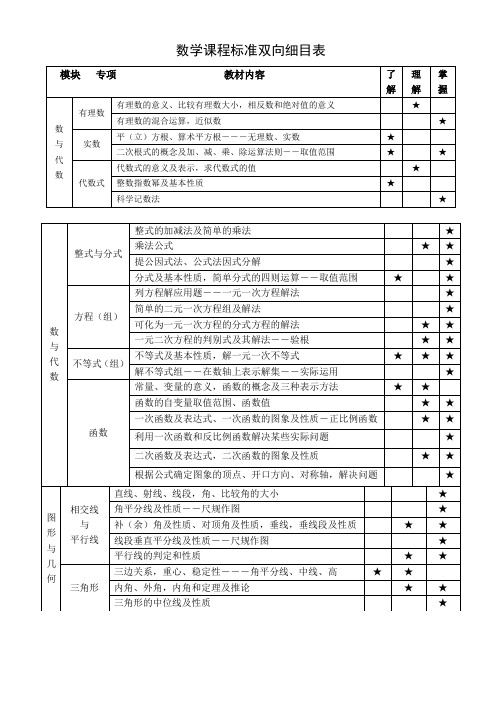
★
根据公式确定图象的顶点、开口方向、对称轴,解决问题
★
图形与
几何
相交线与
平行线
直线、射线、线段,角、比较角的大小
★
角平分线及性质――尺规作图
★
补(余)角及性质、对顶角及性质,垂线,垂线段及性质
★
★
线段垂直平分线及性质――尺规作图
★
平行线的判定和性质
★
★
三角形
三边关系,重心、稳定性―――角平分线、中线、高
数学课程标准双向细目表
模块专项教材内容
了解
理解
掌握
数与
代数
有理数
有理数的意义、比较有理数大小,相反数和绝对值的意义
★
有理数的混合运算,近似数
★
实数
平(立)方根、算术平方根―――无理数、实数
★
二次根式的概念及加、减、乘、除运算法则――取值范围
★
★
代数式
代数式的意义及表示,求代数式的值
★
整数指数幂及基本性质
★
图形与
坐标
认识并能画平面直角坐标系
★
图形变换后点的坐标的变化
★
方位角的识别和应用
★
互逆命题、定理
★
统计与概率
统计
收集、整理、描述和分析数据
★
★
总体、个体、样本、中位数、众数、频数、频率
★
利用扇形统计图表示数据――制作直方图
★
计算加权平均数、计算方差
★Байду номын сангаас
★
概率
概率的概念
★
运用列举法计算简单事件发生的概率
★
★
点与圆、直线与圆位置关系――垂径定理
新课标24个新话题目录:奇速英语.pdf

新课标24个新话题目录-奇速英语1.Personal background2.Family, Friends and People Around3.Living Environment4.Daily Routines5.School6.Personal Interests7.Feelings and Moods8.Plans and Arrangements9.Festival, Holidays and Celebrations10.Shopping11.Food and Drinks12.Weather13.Interpersonal Communication14.Hygiene and Health15.Recreation and Sports16.Travel and Transport17.Naturenguage Learning19.The World and the Environment20.Safety and First aid21.Popular Science and Modern Technology22.History and Societymunication24.Stories and Poems中学英语课程标准24个话题项目说明:标*号的项目为八级要求。
1. 个人情况(Personal information)(1)Individual data (name, age, date of birth, place of birth, telephone number, address, postal code, e-mail address, ID number, etc. )(2)Family data (name, age, relatihip, etc. )(3)School data (school, grade, class, teacher, etc. )(4)Data uses (filling out forms and applicati, etc. )(5)Jobs and career (office worker, worker, teacher, doctor, farmer, driver, official, etc. )2. 家庭、朋友与周围的人(Family, friends and people around)(1)Family and relatives (grandparents, parents, brother, sister, aunt, uncle, cousin, son, daughter, etc. ))(2)Friends (close neighbour, schoolmate, classmate, roommate, team-mate, etc. (3)Other people (neighbour, local shopkeeper, teacher, colleague, etc. )3. 周围的环境(Personal environments)(1)Kinds of homes (apartment, house, dormitory, etc. )(2)Rooms in homes (bedroom, kitchen, living room, bathroom, etc. )(3)Furniture & home items (table, chair, sofa, desk, bed, television, etc. )(4)Schools (classroom, playground, hall, computer room, office, etc. )(5)Outside (grocery store, book shop, clothing store, market, bank, library, museum, cinema, theatre, park, road, etc. )4. 日常活动(Daily routines)(1)Getting ready (time for school, playing, bed)(2)Dressing, brushing teeth, washing hands and face, taking a shower, etc.(3)Eating (breakfast, lunch, snacks and dinner)(4)Daily chores (tidying, sweeping, doing dishes, cooking)(5)Homework (reading, writing, studying, etc. )(6)Family time (watching television, going out, visiting, etc. )5. 学校生活(School life)(1)School building (classroom, office, library, washroom, etc. )(2)School organization (grade, class, subject, break, schedule, etc. )(3)People (teacher, classmate, schoolmate, cleaner, etc. )(4)Subjects (Chinese, maths, English, geography, history, etc. )(5)Activities (sports, extra-curricular involvement, trip, etc. )(6)Instructi (Please listen, read, get into groups, act, etc. )(7)Educational methods (preview, review, discuss, presentation, summary)6. 兴趣与爱好(Interests and hobbies)(1)Less (music, dance, acting, sport, etc. )(2)Games (physical games, computer games, sports, etc. )(3)Hobbies (collecting stamps, coins, dolls, etc. )(4)Reading (books, newspapers, comics, etc. )(5)Cultural events (film, theatre, concert, opera, etc. )(6)Entertainment (listening to radio, watching TV, playing CD, DVD, etc. )(7)Socializing (having parties, issuing invitati, going for picnics, going sightseeing, entertaining guests, etc. )(8)Expressing your reacti to these activities7. 个人感情(Emoti)(1)Describing feelings (happy, sad, angry, upset, pleased, proud, lonely, worried, nervous, afraid, etc. )(2)Expressing emoti (smiling, laughing, crying, shouting, etc. )(3)Describing facial expressi and gestures8. 人际关系(Interpersonal relatihips)(1)People (parent, brother, sister, other family members, friend, neighbour, teacher, etc. )(2)Social behaviours (greeting, introducing, giving thanks, asking for permission, asking for help, solving problems, dealing with conflicts, etc. )(3)Getting together (making plans / arrangements, time, date, place, event, etc. )9. 计划与愿望(Plans and intenti)(1)Planning (holidays, social events, travel, further education, jobs, etc. )(2)Organising (asking for advice, asking for help, asking for permission,exploring possibilities, expressing needs and wants, etc. )10. 节假日活动(Festivals, holidays and celebrati)(1)Cultural festivals (Spring Festivals, New Year's Day, Christmas, etc. )(2)Religious holidays (Christmas, Easter, Ramada, etc. )(3)Personal celebrati (birthday, anniversary, graduation, etc. )11. 购物(Shopping)(1)Planning (shopping list, needs, wants, etc. )(2)Products (clothes, groceries, personal items, electronics, etc. )(3)Selecting (quality, weights, measures, size, colour, style, etc. )(4)Paying (price, quantity, etc. )12. 饮食(Food and drink)(1)Meats (beef, chicken, pork, fish, etc. )(2)Soups (chicken, tofu, vegetable, etc. )(3)Vegetables (cabbage, eggplant, etc. )(4)Staple food (rice, bread, noodles, cake)(5)Drinks (milk, water, juice, soft drink, coke, alcoholic drinks, beer, wine, etc. )(6)Fast foods (sandwiches, noodles, dumplings, hot dogs, hamburgers, chips, etc. )(7)Snacks (ice cream, chips, etc. )(8)Eating customs (ways of eating, kinds of food, times to eat, table manners, chopsticks, knife, fork, etc. )(9)Requesting or offering different foods and drinks(10)Likes and dislikes (favourite food, favourite drinks, etc. )(11)Ordering food and/or drinks13. 健康(Health)(1)Eating habits(2)Physical fitness and exercise(3)Personal hygiene(4)Illnesses (stomachache, headache, flu, cold, etc. )(5)Medicati(6)Accidents(7)Doctors, nurses & hospitals(8)Describing problems (parts of the body, pains, etc. )(9)Medical insurance14. 天气(Weather)(1)Describing weather (sunny, cloudy, windy, rainy, hot, warm, cold, cool, etc. )(2)Extreme weather (storms, gales, hurricanes, etc. )(3)Dressing for the weather (coat, hat, umbrella, raincoat, windbreaker, etc. )15. 文娱与体育(Entertainment and sports)(1)Movies and theatre(2)Music and dance (folk music and dance, popular music and classical music)(3)Team games (football, basketball, volleyball, etc. )(4)Games of two or four (table tennis, tennis, golf, etc. )(5)Racing (running, swimming, horse racing, etc. )(6)International sports events (Olympic Games, World Cup, Football League, etc. )(7)Spectators and fans(8)Physical exercises16. 旅游和交通(Travel and transport)(1)Methods of transportation (walking, cycling, horse riding, taking buses, trains, boats, planes)(2)Travel (schedules, maps, tickets, fares)(3)Getting and asking directi (left, right, straight ahead, north, south, east, west, etc. )(4)Safety rules and warnings (traffic lights, caution, walk, stop, etc. )(5)Inquiring and making reservati (hotels, tourist spots, etc, )(6)International travel (passport, visas, expenses, currency, etc. )(7)Describing a journey17. 语言学习(Language learning)(1)Differences between American English and British English(2)Language and culture(3)Language learning difficulties(4)Attitudes to language and communication(5)Language learning strategies(6)Communicati repair18. 自然(Nature))(1)Plants (green plants, trees, bushes, grass, vegetables, crops, flowers. etc. (2)Animals (farm animals, wild animals, endangered animals, pets, etc. )(3)Heavenly bodies (The sun, the earth, the moon and stars, etc.)(4)Describing land (cities, farms, hill, mountains, lakes, rivers, etc. )(5)Natural disasters (Volcano,earthquake, etc. )*19. 世界和环境(The world and the environment)(1)Countries and maps (China, Great Britain, United States, Australia, Canada, New Zealand, Japan, Russia, India, Egypt, Cuba. etc. )(2)Issues (pollution, land use and quality, population growth, housing, etc. )20. 科普知识与现代技术(Popular science and modern technology)(1)Recent inventi, medical advances, technological advances, etc.(2)Computer science21. 热点话题(Topical issues)(1)Population *(2)Environmental cervation *(3)Crime and punishment *(4)Social differences *(5)Pollution22. 历史和地理(History and geography)(1)General knowledge of history and geography about China(2)General knowledge of history and geography about the world(3)Historic events(4)Historical pers23. 社会(Society)(1)Nationality and people(2)Famous people (contemporary)(3)Law (rules and regulati, traffic codes)(4)Ways of dressing (types of clothes, daily clothes or dress, situation and dressing)(5)Names of religi *(6)Religi and culture *(7)Customs and culture24. 文学与艺术(Literature and art)(1)Forms of literature and art (play, drama, novel, essay, poetry, short story)(2)Famous literary people and artists *。
话题项目表

话题项目表本表依据《英语课程标准》的相关要求,综合北京市目前正在使用的教材所共有的话题,提出具体目标。
使用本表应注意以下事项:1.本表提出的12个基本话题,包含40余项学生应能使用简单语言进行话语活动的生活项目,由此构成学生用语言做事情的行动目标。
2.各项行动目标都只是要求学生在已学的语言知识范围内来做事情。
3.各项行动目标都应被限定在学生所用教材的具体情景范围之内。
4.各项行动目标包括昕、说、读、写的综合运用,但并不是每项目标都要涉及写的技能,教师应把写的活动要求限制在学生力所能及的有限范围之内。
1.个人情况(Personal information)能够向他人介绍个人的基本情况(姓名、年龄、出生日期、家庭成员、电话号码、爱好、邮箱地址、外貌特征和自己的生活情况等),并能够写出自己简单的基本情况。
能够听懂他人的有关个人信息,并且记录简单信息。
2.家庭(Family and home)能够介绍家庭成员(姓名、年龄、职业、外貌特征、爱好等)的基本信息。
能够利用所学的语言,互相询问有关对方家庭的基本情况。
能够简单地写出家庭成员的基本信息。
能够介绍家庭住房的各种房间名称,并能简单描述部分室内的物品。
能够简单介绍家庭成员平时经常在这些房间做的事情。
尝试着设计自己梦想中的卧室,调查同学家里房间的拥有情况。
3.学校(School life)能够介绍自己的学校生活(学校名称、任课教师、专业教室的名称等)。
能够介绍自己的学习科目,喜欢和不喜欢的科目,并能简单说明理由。
能够向他人介绍自己的课程表,并设计自己喜欢的课程表。
4.朋友(Friends)能够简单介绍自己的朋友(姓名、年龄、外貌特征、爱好等)。
能够简单地写出朋友的主要信息。
5.天气(Weather)能够谈论有关天气状况。
能够听懂简单的天气预报,并记录相关的信息。
能根据天气状况,设计自己的活动计划(合适的着装、活动去向、活动目的等)。
6.饮食(Food and Drink)能够表达自己喜欢和不喜欢的食物,并简单说明理由。
新课标24个新话题目录:奇速英语.pdf
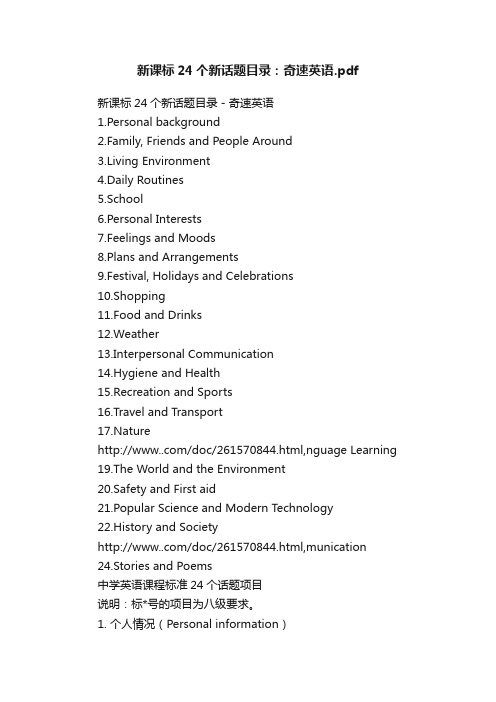
新课标24个新话题目录:奇速英语.pdf新课标24个新话题目录-奇速英语1.Personal background2.Family, Friends and People Around3.Living Environment4.Daily Routines5.School6.Personal Interests7.Feelings and Moods8.Plans and Arrangements9.Festival, Holidays and Celebrations10.Shopping11.Food and Drinks12.Weather13.Interpersonal Communication14.Hygiene and Health15.Recreation and Sports16.Travel and Transport17.Nature/doc/261570844.html,nguage Learning19.The World and the Environment20.Safety and First aid21.Popular Science and Modern Technology22.History and Society/doc/261570844.html,munication 24.Stories and Poems中学英语课程标准24个话题项目说明:标*号的项目为八级要求。
1. 个人情况(Personal information)(1)Individual data (name, age, date of birth, place of birth, telephone number, address, postal code, e-mail address, ID number, etc. )(2)Family data (name, age, relatihip, etc. )(3)School data (school, grade, class, teacher, etc. )(4)Data uses (filling out forms and applicati, etc. )(5)Jobs and career (office worker, worker, teacher, doctor, farmer, driver, official, etc. )2. 家庭、朋友与周围的人(Family, friends and people around)(1)Family and relatives (grandparents, parents, brother, sister, aunt, uncle, cousin, son, daughter, etc. ))(2)Friends (close neighbour, schoolmate, classmate, roommate, team-mate, etc. (3)Other people (neighbour, local shopkeeper, teacher, colleague, etc. )3. 周围的环境(Personal environments)(1)Kinds of homes (apartment, house, dormitory, etc. )(2)Rooms in homes (bedroom, kitchen, living room, bathroom, etc. )(3)Furniture & home items (table, chair, sofa, desk, bed, television, etc. )(4)Schools (classroom, playground, hall, computer room, office, etc. )(5)Outside (grocery store, book shop, clothing store, market, bank, library, museum, cinema, theatre, park, road, etc. )4. 日常活动(Daily routines)(1)Getting ready (time for school, playing, bed)(2)Dressing, brushing teeth, washing hands and face, taking a shower, etc.(3)Eating (breakfast, lunch, snacks and dinner)(4)Daily chores (tidying, sweeping, doing dishes, cooking)(5)Homework (reading, writing, studying, etc. )(6)Family time (watching television, going out, visiting, etc. )5. 学校生活(School life)(1)School building (classroom, office, library, washroom, etc. )(2)School organization (grade, class, subject, break, schedule, etc. )(3)People (teacher, classmate, schoolmate, cleaner, etc. )(4)Subjects (Chinese, maths, English, geography, history, etc. )(5)Activities (sports, extra-curricular involvement, trip, etc. )(6)Instructi (Please listen, read, get into groups, act, etc. )(7)Educational methods (preview, review, discuss, presentation, summary)6. 兴趣与爱好(Interests and hobbies)(1)Less (music, dance, acting, sport, etc. )(2)Games (physical games, computer games, sports, etc. )(3)Hobbies (collecting stamps, coins, dolls, etc. )(4)Reading (books, newspapers, comics, etc. )(5)Cultural events (film, theatre, concert, opera, etc. )(6)Entertainment (listening to radio, watching TV, playing CD, DVD, etc. )(7)Socializing (having parties, issuing invitati, going for picnics, going sightseeing, entertaining guests, etc. )(8)Expressing your reacti to these activities7. 个人感情(Emoti)(1)Describing feelings (happy, sad, angry, upset, pleased, proud, lonely, worried, nervous, afraid, etc. )(2)Expressing emoti (smiling, laughing, crying, shouting, etc. )(3)Describing facial expressi and gestures8. 人际关系(Interpersonal relatihips)(1)People (parent, brother, sister, other family members, friend, neighbour, teacher, etc. )(2)Social behaviours (greeting, introducing, giving thanks, asking for permission, asking for help, solving problems, dealing with conflicts, etc. )(3)Getting together (making plans / arrangements, time, date, place, event, etc. )9. 计划与愿望(Plans and intenti)(1)Planning (holidays, social events, travel, further education, jobs, etc. )(2)Organising (asking for advice, asking for help, asking for permission,。
英语课程标准-话题项目表

英语课程标准-话题项目表(这是新颁布课标的话题项目表,尽量选用二级名称作为话题名称,请勿自造话题名称。
)1.个人情况(Personal background)(1) 个人情况(Personal information)(2) 家庭信息(Family information)(3) 学校信息(School information)(4) 兴趣与爱好(Interests and hobbies)(5) 工作与职业(Jobs and careers)2.家庭、朋友与周围的人(Family, friends and people around)(6) 家人和亲友(Family and relatives)(7) 朋友(Friends)(8) 其他人(Other people)3.周围的环境(Personal environment)(9) 房屋与住所(Houses and apartments)(10) 居室(Rooms in homes)(11) 家具和家庭用品(Furniture & household items)(12) 社区(Community)4.日常活动(Daily routines)(13) 家庭生活(Life at home)(14) 学校生活(School life)(15) 周末活动(Weekend activities)5.学校(School)(16) 学校设施(School facilities)(17) 学校人员(People at school)(18) 学习科目(School subjects)(19) 学校活动(School activities)6.个人兴趣(Personal interests)(20) 游戏与休闲(Games and leisure)(21) 爱好(Hobbies)(22) 娱乐活动(Entertainments)(23) 旅游(Tourism)7.情感与情绪(Feelings and moods)(24) 情感(Feelings)(25) 情绪(Moods)8.人际交往(Interpersonal communications)(26) 社会行为(Social behaviours)(27) 合作与交流(Cooperation and communication)9.计划与安排(Plans and arrangements)(28) 计划(Planning)(29) 安排(Arranging)10.节假日活动(Festivals, holidays and celebrations)(30) 节日与假日(Festivals and holidays)(31) 庆祝活动(Celebrations)11.购物(Shopping)(32) 购物计划(Shopping planning)(33) 商品(Goods)(34) 选择(Selecting)(35) 付款(Payment)(36) 个人喜好(Personal preference)12.饮食(Food and drink )(37) 食物(Food)(38) 饮料(Drinks)(39) 饮食习俗(Eating customs)(40) 点餐(Ordering food and drink)13.卫生与健康(Hygiene and health)(41) 身体部位(Parts of body)(42) 体育健身(Physical fitness and exercise)(43) 个人卫生(Personal hygiene)(44) 疾病(Illnesses)(45) 健康饮食(Health diet)(46) 医疗(Medical care)14.安全与救护(Safety and first aid)(47) 安全守则(Safety rules)(48) 意外(Accidents)(49) 急救(First aid)(50) 自我保护(Self protection)15. 天气(Weather)(51) 天气情况(Weather conditions)(52) 天气预报(Weather report)(53) 衣着与天气(Appropriate dressing for the weather)16.文娱与体育(Recreation and sports)(54) 电影与戏剧(Movies and theatre)(55) 音乐与舞蹈(Music and dance)(56) 体育与赛事(Sports and matches)17.旅游与交通(Travel and transport)(57) 旅行(Travel)(58) 交通运输方式(Modes of transportation)(59) 交通标志(Traffic signs)(60) 使用地图(Reading maps)18.通讯(Communications)(61) 写信(Writing letters)(62) 打电话(Making phone calls)(63) 使用互联网(Using the Internet)19. 语言学习( Language learning)(64) 语言学习经历(Language learning experiences)(65) 语言与文化(Language and culture)(66) 语言学习的策略(Language learning strategies)(67) 体态语(Body language)20.自然(Nature)(68) 动物和植物(Animals and plants)(69) 山川与河流(Mountains and rivers)(70) 季节(Seasons)(71) 宇宙(Universe)(72) 人与自然(Man and nature)21.世界与环境(The world and the environment)(73) 国家与民族(Countries and nationalities)(74) 环境保护(Environmental protection)(75) 人口(Population)22.科普知识与现代技术(Popular science and modern technology)(76) 数字与数据(Figures and data)(77) 科普知识(Popular science)(78) 发明与技术(Inventions and technological advances)(79) 信息技术(Information technology)23.历史与社会(History and society)(80) 中国历史与世界历史(History of China and the world)(81) 著名人物(Famous people)24.故事与诗歌(Stories and poems)(82) 故事(Stories)(83) 诗歌(Poems)(84) 短剧(Short plays)(85) 作家(Writers)人生渺如尘埃,小如露珠,寻常如泥土,从不可知处而来,到不可知处而去。
英语新课标小课题

英语新课标小课题
英语新课标小课题通常指的是针对英语教学中特定领域或问题的研究,这些课题可以是教学方法、学习策略、语言技能、文化理解等。
以下
是一些可能的英语新课标小课题内容:
1. 英语教学中的多媒体应用:探讨如何利用多媒体技术提高学生的语
言学习兴趣和效率,包括视频、音频、在线互动平台等。
2. 跨文化交际能力的培养:研究如何在英语教学中融入跨文化交际能
力的培养,帮助学生理解不同文化背景下的交流方式。
3. 英语阅读策略的优化:分析不同阅读策略在英语教学中的应用,以
及如何根据学生的需求选择合适的阅读方法。
4. 英语写作技能的提高:探讨如何通过写作练习和反馈机制,提高学
生的英语写作能力,包括语法、词汇、逻辑结构等方面。
5. 英语口语表达的流利度:研究如何通过模拟对话、角色扮演等活动,提高学生的英语口语表达能力和流利度。
6. 英语词汇教学的有效方法:分析词汇教学中的常见问题,并提出有
效的方法来帮助学生扩大词汇量和加深词汇理解。
7. 英语语法教学的创新途径:探索如何通过游戏、故事、歌曲等创新
方式,使语法学习变得更加生动和有趣。
8. 英语听力理解的技巧:研究如何通过听力练习和策略指导,提高学
生对英语口语的理解能力。
9. 英语教学中的评估与反馈:探讨如何设计有效的评估体系,以及如何通过反馈促进学生的学习进步。
10. 英语教学中的个性化学习:研究如何根据学生的不同学习风格和需求,提供个性化的教学支持。
这些小课题可以为英语教师提供研究方向,帮助他们改进教学方法,提高教学质量,同时也为学生提供更丰富的学习体验。
新课标考题双向细目表

Ⅰ
基因工程的原理及技术
Ⅱ
40(1、2)
基因工程的应用
Ⅱ
蛋白质工程
Ⅰ
植物的组织培养
Ⅱ
40(1、3)
动物的细胞培养与体细胞克隆
Ⅰ
细胞融合与单克隆抗体
Ⅱ
40
动物胚胎发育的基本过程与胚胎工程的理论基础
Ⅰ
40(2)
胚胎干细胞的移植
Ⅰ
40(3)
胚胎工程的应用
Ⅱ
转基因生物的安全性
Ⅰ
生物武器对人类的威胁
Ⅰ
生物技术中的伦理问题
Ⅰ
40(1、4)
简述生态工程的原理
Ⅱ
40(3)
生态工程的实例
Ⅰ
选修1、微生物的利用
生物技术在食品加工及其他方面的应用
探究实验
29
30
合计
67+19+16=102点
备注:1、★表示非选择题及选做题,不标的为选择题。
2、数字为题号,字母为能力类别(A:理解能力;B:实验与探究能力;C:获取信息的能力;D:综合运用能力)
附表1、考题双向细目表
知识内容
考纲要求
13
市1
附1
三1
蛋白质的结构和功能
Ⅱ
核酸的结构和功能
Ⅱ
糖类的种类和作用
Ⅱ
29(1)
脂质的种类和作用
Ⅱ
水和无机盐的作用
Ⅰ
细胞学说的建立过程
Ⅰ
1C
1A
多种多样的细胞
Ⅱ
细胞膜系统的结构和功能
Ⅱ
2AD
2
主要细胞器的结构和功能
Ⅱ
1D
细胞核的结构和功能
Ⅱ
【英语】《课程标准》话题项目表
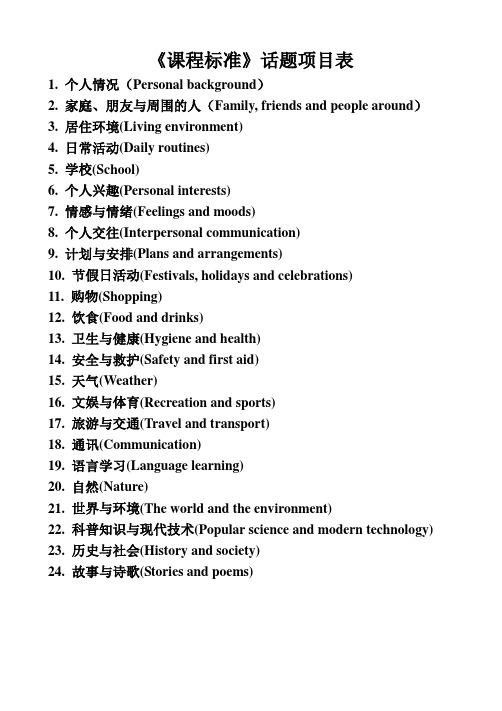
《课程标准》话题项目表1. 个人情况(Personal background)2. 家庭、朋友与周围的人(Family, friends and people around)3. 居住环境(Living environment)4. 日常活动(Daily routines)5. 学校(School)6. 个人兴趣(Personal interests)7. 情感与情绪(Feelings and moods)8. 个人交往(Interpersonal communication)9. 计划与安排(Plans and arrangements)10. 节假日活动(Festivals, holidays and celebrations)11. 购物(Shopping)12. 饮食(Food and drinks)13. 卫生与健康(Hygiene and health)14. 安全与救护(Safety and first aid)15. 天气(Weather)16. 文娱与体育(Recreation and sports)17. 旅游与交通(Travel and transport)18. 通讯(Communication)19. 语言学习(Language learning)20. 自然(Nature)21. 世界与环境(The world and the environment)22. 科普知识与现代技术(Popular science and modern technology)23. 历史与社会(History and society)24. 故事与诗歌(Stories and poems)2016年泉州卷第三部分阅读理解(A、B、C、E篇每小题10分,D篇每小题10分,满分10分)本语篇介绍意大利北部的一座古老城市——Siena, 考查的话题是《课程标准》第23个“历史与社会”。
51. Siena is an old city in the north of Italy. It began with agroup of people living on its hills over 2,900 years ago.Around the year 1100, Siena became an important businesscenter in Italy. In 1472, the first bank of the world was built inthis city and has been doing business ever since.Today Siena is famous for keeping its"old face". For example, its city walls, which helped keep the city safe in the past, are hundreds of years old now and look almost the same as before. Also,many old buildings are seen at the Piazza del Campo, the most important meeting place of the city. Few things have really changed in this center of public life for hundreds of years. Now people still go to the open space for sharing news, shopping, or playing sports. There is one more thing that helps keep Siena's old face: cars cannot enter the city most of the time.True, Siena is old, but it's beautifully old. People are welcome to visit this beautiful city and walk into the past.B、C两篇,根据短文内容,从每小题A、B、C三个选项中选出一个最佳答案.本语篇是一个寓言故事,属于《课程标准》第24个话题“故事与诗歌”。
英语课标 话题项目表24个

附录5 话题项目表注:二级话题项目参照“内容标准”中的“语言知识”部分。
1.个人情况(Personal information)(1) 个人情况 (Personal data)(2) 家庭信息 (Family data)(3) 学校信息 (School data)(4) 兴趣与爱好 (Interests and hobbies)(5) 工作与职业 (Jobs and careers)2.家庭、朋友与周围的人(Family, friends and people around)(6) 家人和亲友 (Family and relatives)(7) 朋友 (Friends)(8) 其他人(Other people)3.周围的环境 (Personal environment)(9) 房屋与住所 (Kinds of homes)(10) 居室 (Rooms in homes)(11) 家具和家庭用品 (Furniture & household items)(12) 社区 (Community)4.日常活动 (Daily routines)(13) 家庭生活 (Life at home)(14) 学校生活 (School life)(15) 周末活动 (Weekend activities)5.学校 (School)(16) 学校设施 (School facilities)(17) 学校人员 (People at school)(18) 学习科目 (School subjects)(19) 学校活动 (School activities)6.个人兴趣(Personal interests)(20) 游戏与休闲 (Games and leisure)(21) 爱好 (Hobbies)(22) 娱乐活动 (Entertainments)(23) 旅游 (Tourism)7.情感与情绪(Feelings and emotions)(24) 描述情感(Describing feelings)(25) 表达情感(Expressing emotions)8.人际交往 (Interpersonal communications)(26) 社会行为 (Social behaviours)(27) 合作与交流(Cooperation and communication)9.计划与安排(Plans and arrangements)(28) 计划 (Planning)(29) 安排 (Arranging)10.节假日活动(Festivals, holidays and celebrations)(30) 节日与假日(Festivals and holidays)(31) 个人庆典 (Personal celebrations)11.购物 (Shopping)(32) 计划(Planning)(33) 商品(Products)(34) 选择(Selecting)(35) 付款(Paying)(36) 个人喜好(Personal preference)12.饮食 (Food and drink )(37) 食物(Food)(38) 饮料(Drinks)(39) 饮食习俗(Eating customs)(40) 点餐 (Ordering food and drink)13.卫生与健康(Hygiene and health)(41) 身体部位(Parts of body)(42) 体育健身 (Physical fitness and exercise)(43) 个人卫生(Personal hygiene)(44) 疾病(Illnesses)(45) 健康饮食 (Health diet)(46) 医疗 (Medical care)14.安全与救护(Safety and first aid)(47) 安全守则 (Safety rules)(48) 意外 (Accidents)(49) 急救 (First aid)(50) 自我保护 (Self protection)15. 天气 (Weather)(51) 描述天气情况 (Describing weather)(52) 天气预报 (Weather report)(53) 衣着与天气 (Dressing for the weather)16.文娱与体育 (Recreation and sports)(54) 电影与戏剧 (Movies and theatre)(55) 音乐与舞蹈 (Music and dance)(56) 体育与赛事 (Sports and matches)17.旅游与交通 (Travel and transport)(57) 旅行 (Travel)(58) 交通运输方式 (Modes of transportation)(59) 问路 (Asking the way)(60) 交通标志 (Road signs)(61) 使用地图 (Reading maps)18.通讯(Communications)(62) 写信 (Writing letters)(63) 打电话 (Making phone calls)(64) 使用互联网 (Using the Internet)19. 语言学习( Language learning)(65) 语言学习经历 (Language learning experiences)(66) 语言与文化 (Language and culture)(67) 语言学习的策略 (Language learning strategies)(68) 体态语 (Body language)20.自然(Nature)(69) 动物和植物(Animals and plants)(70) 山川与河流 (Mountains and rivers)(71) 季节 (Seasons)(72) 宇宙(Universe)(73) 人与自然 (Man and naure)21.世界与环境(The world and the environment)(74) 国家与民族 (Countries and nationalities)(75) 环境保护 (Environmental protection)(76) 人口 (Population)22.科普知识与现代技术(Popular science and modern technology)(77) 数字与数据 (Numbers and data)(78) 科普知识 (Popular science)(79) 发明与技术 (Inventions and technological advances)(80) 信息技术 (Information technology)23.历史与社会(History and society)(81) 中国历史与世界历史 (History of China and the world)(82) 著名人物 (Famous people)24.故事与诗歌(Stories and poems)(83) 故事 (Stories)(84) 诗歌 (Poems)(85) 短剧 (Short plays)(86) 作家 (Writers)。
2023年全国新课程卷I体育 命题双向细目表
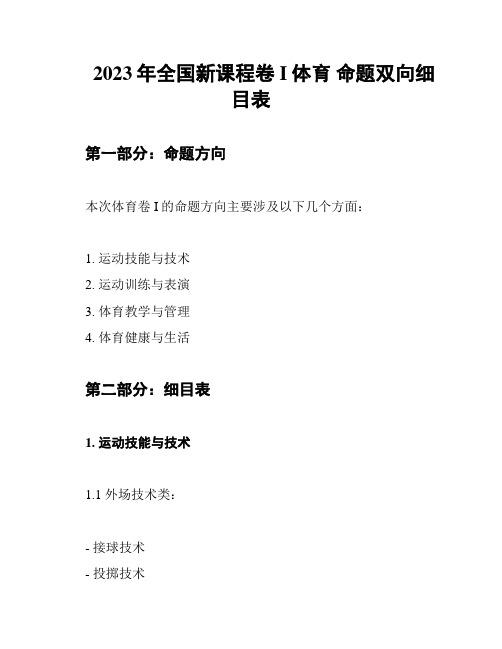
2023年全国新课程卷I体育命题双向细
目表
第一部分:命题方向
本次体育卷I的命题方向主要涉及以下几个方面:
1. 运动技能与技术
2. 运动训练与表演
3. 体育教学与管理
4. 体育健康与生活
第二部分:细目表
1. 运动技能与技术
1.1 外场技术类:
- 接球技术
- 投掷技术
- 打击技术
1.2 室内技术类:
- 接球技术
- 投掷技术
- 射门技术
2. 运动训练与表演
2.1 训练计划类:
- 训练目标与计划制定- 训练方法与周期安排- 训练过程与效果评估
2.2 身体素质类:
- 身体灵活性训练
- 身体耐力训练
- 身体协调性训练
3. 体育教学与管理
3.1 教学设计类:
- 教学目标与教学内容设置- 教学方法与教学手段运用- 教学反馈与评估
3.2 班级管理类:
- 课堂纪律与管理
- 学生参与与合作
- 奖惩机制与激励方法
4. 体育健康与生活
4.1 健康知识类:
- 饮食与营养
- 心理健康与压力管理
- 运动与生活惯
4.2 体育活动类:
- 健身与运动项目推广
- 社区体育活动策划
- 体育赛事组织与管理
以上是2023年全国新课程卷I体育命题双向细目表的主要内容。
具体的考题内容将在考试之前由相关教育部门公布,请参考相关文件,以确保信息的准确性。
*请注意,以上细目表仅为参考,请以官方公布的命题要求为准。
*。
新课标英语小学目录

新课标英语小学目录一、前言随着全球化的不断深入,英语作为国际交流的重要语言,其重要性日益凸显。
新课标英语教育旨在培养学生的英语综合运用能力,提高学生的语言素养,为学生的终身学习和全面发展奠定基础。
二、课程目标1. 语言知识:掌握基本的英语词汇、语法和句型结构。
2. 语言技能:培养学生的听、说、读、写四项基本技能。
3. 文化意识:了解英语国家的文化背景,培养学生的跨文化交际能力。
4. 学习策略:引导学生形成有效的英语学习策略,提高自主学习能力。
5. 情感态度:激发学生学习英语的兴趣,培养积极的情感态度。
三、课程内容1. 基础词汇:涵盖日常生活、学习、自然、社会等方面的基础词汇。
2. 语法知识:包括名词、动词、形容词、副词等词类的基本用法和时态、语态等语法规则。
3. 句型结构:教授简单句、并列句和复合句的基本结构。
4. 听力训练:通过听力材料,训练学生捕捉信息、理解大意和细节的能力。
5. 口语表达:鼓励学生进行日常对话、角色扮演等口语活动,提高口语交际能力。
6. 阅读理解:通过阅读材料,培养学生的阅读兴趣和理解能力。
7. 写作训练:指导学生进行简单写作,如写日记、书信等。
8. 文化知识:介绍英语国家的节日、习俗、礼仪等文化知识。
四、教学方法1. 情景教学:创设真实或模拟的语言使用情景,让学生在实际语境中学习和运用英语。
2. 任务型教学:通过完成具体的语言任务,激发学生的学习兴趣和参与热情。
3. 合作学习:鼓励学生进行小组合作,培养团队协作能力和交流能力。
4. 多媒体教学:利用多媒体教学资源,丰富教学内容,提高教学效果。
5. 游戏化学习:通过英语游戏,让学生在轻松愉快的氛围中学习英语。
五、评价方式1. 形成性评价:通过课堂表现、作业、小组活动等,持续跟踪学生的学习进展。
2. 终结性评价:通过期中、期末考试,全面评价学生的学习成果。
3. 自我评价:引导学生进行自我反思,提高自我评价和自我调整的能力。
4. 同伴评价:通过同伴互评,培养学生的批判性思维和公正评价的能力。
- 1、下载文档前请自行甄别文档内容的完整性,平台不提供额外的编辑、内容补充、找答案等附加服务。
- 2、"仅部分预览"的文档,不可在线预览部分如存在完整性等问题,可反馈申请退款(可完整预览的文档不适用该条件!)。
- 3、如文档侵犯您的权益,请联系客服反馈,我们会尽快为您处理(人工客服工作时间:9:00-18:30)。
新课标话题项目表说明:标*号的项目为八级要求。
1. 个人情况(Personal information)(1)Individual data (name, age, date of birth, place of birth, telephone number, address, postal code, e-mail address, ID number, etc. )(2)Family data (name, age, relationship, etc. )(3)School data (school, grade, class, teacher, etc. )(4)Data uses (filling out forms and applications, etc. )(5)Jobs and career (office worker, worker, teacher, doctor, farmer, driver, official, etc. )2. 家庭、朋友与周围的人(Family, friends and people around)(1)Family and relatives (grandparents, parents, brother, sister, aunt, uncle, cousin, son, daughter, etc. )(2)Friends (close neighbour, schoolmate, classmate, roommate, team-mate, etc. )(3)Other people (neighbour, local shopkeeper, teacher, colleague, etc. )3. 周围的环境(Personal environments)(1)Kinds of homes (apartment, house, dormitory, etc. )(2)Rooms in homes (bedroom, kitchen, living room, bathroom, etc. )(3)Furniture & home items (table, chair, sofa, desk, bed, television, etc. )(4)Schools (classroom, playground, hall, computer room, office, etc. )(5)Outside (grocery store, book shop, clothing store, market, bank, library, museum, cinema, theatre, park, road, etc. )4. 日常活动(Daily routines)(1)Getting ready (time for school, playing, bed)(2)Dressing, brushing teeth, washing hands and face, taking a shower, etc.(3)Eating (breakfast, lunch, snacks and dinner)(4)Daily chores (tidying, sweeping, doing dishes, cooking)(5)Homework (reading, writing, studying, etc. )(6)Family time (watching television, going out, visiting, etc. )5. 学校生活(School life)(1)School building (classroom, office, library, washroom, etc. )(2)School organization (grade, class, subject, break, schedule, etc. )(3)People (teacher, classmate, schoolmate, cleaner, etc. )(4)Subjects (Chinese, maths, English, geography, history, etc. )(5)Activities (sports, extra-curricular involvement, trip, etc. )(6)Instructions (Please listen, read, get into groups, act, etc. )(7)Educational methods (preview, review, discuss, presentation, summary)6. 兴趣与爱好(Interests and hobbies)(1)Lessons (music, dance, acting, sport, etc. )(2)Games (physical games, computer games, sports, etc. )(3)Hobbies (collecting stamps, coins, dolls, etc. )(4)Reading (books, newspapers, comics, etc. )(5)Cultural events (film, theatre, concert, opera, etc. )(6)Entertainment (listening to radio, watching TV, playing CD, DVD, etc. )(7)Socializing (having parties, issuing invitations, going for picnics, going sightseeing, entertaining guests, etc. )(8)Expressing your reactions to these activities7. 个人感情(Emotions)(1)Describing feelings (happy, sad, angry, upset, pleased, proud, lonely, worried, nervous, afraid, etc. )(2)Expressing emotions (smiling, laughing, crying, shouting, etc. )(3)Describing facial expressions and gestures8. 人际关系(Interpersonal relationships)(1)People (parent, brother, sister, other family members, friend, neighbour, teacher, etc. )(2)Social behaviours (greeting, introducing, giving thanks, asking for permission, asking for help, solving problems, dealing with conflicts, etc. )(3)Getting together (making plans / arrangements, time, date, place, event, etc. )9. 计划与愿望(Plans and intentions)(1)Planning (holidays, social events, travel, further education, jobs, etc. )(2)Organising (asking for advice, asking for help, asking for permission, exploring possibilities, expressing needs and wants, etc. )10. 节假日活动(Festivals, holidays and celebrations)(1)Cultural festivals (Spring Festivals, New Year's Day, Christmas, etc. )(2)Religious holidays (Christmas, Easter, Ramada, etc. )(3)Personal celebrations (birthday, anniversary, graduation, etc. )11. 购物(Shopping)(1)Planning (shopping list, needs, wants, etc. )(2)Products (clothes, groceries, personal items, electronics, etc. )(3)Selecting (quality, weights, measures, size, colour, style, etc. )(4)Paying (price, quantity, etc. )12. 饮食(Food and drink)(1)Meats (beef, chicken, pork, fish, etc. )(2)Soups (chicken, tofu, vegetable, etc. )(3)Vegetables (cabbage, eggplant, etc. )(4)Staple food (rice, bread, noodles, cake)(5)Drinks (milk, water, juice, soft drink, coke, alcoholic drinks, beer, wine, etc. )(6)Fast foods (sandwiches, noodles, dumplings, hot dogs, hamburgers, chips, etc. )(7)Snacks (ice cream, chips, etc. )(8)Eating customs (ways of eating, kinds of food, times to eat, table manners, chopsticks, knife, fork, etc. )(9)Requesting or offering different foods and drinks(10)Likes and dislikes (favourite food, favourite drinks, etc. )(11)Ordering food and/or drinks13. 健康(Health)(1)Eating habits(2)Physical fitness and exercise(3)Personal hygiene(4)Illnesses (stomachache, headache, flu, cold, etc. )(5)Medications(6)Accidents(7)Doctors, nurses & hospitals(8)Describing problems (parts of the body, pains, etc. )(9)Medical insurance14. 天气(Weather)(1)Describing weather (sunny, cloudy, windy, rainy, hot, warm, cold, cool, etc. )(2)Extreme weather (storms, gales, hurricanes, etc. )(3)Dressing for the weather (coat, hat, umbrella, raincoat, windbreaker, etc. )15. 文娱与体育(Entertainment and sports)(1)Movies and theatre(2)Music and dance (folk music and dance, popular music and classical music)(3)Team games (football, basketball, volleyball, etc. )(4)Games of two or four (table tennis, tennis, golf, etc. )(5)Racing (running, swimming, horse racing, etc. )(6)International sports events (Olympic Games, World Cup, Football League, etc. )(7)Spectators and fans(8)Physical exercises16. 旅游和交通(Travel and transport)(1)Methods of transportation (walking, cycling, horse riding, taking buses, trains, boats, planes)(2)Travel (schedules, maps, tickets, fares)(3)Getting and asking directions (left, right, straight ahead, north, south, east, west, etc. )(4)Safety rules and warnings (traffic lights, caution, walk, stop, etc. )(5)Inquiring and making reservations (hotels, tourist spots, etc, )(6)International travel (passport, visas, expenses, currency, etc. )(7)Describing a journey17. 语言学习(Language learning)(1)Differences between American English and British English(2)Language and culture(3)Language learning difficulties(4)Attitudes to language and communication(5)Language learning strategies(6)Communications repair18. 自然(Nature)(1)Plants (green plants, trees, bushes, grass, vegetables, crops, flowers. etc. )(2)Animals (farm animals, wild animals, endangered animals, pets, etc. )(3)Heavenly bodies (The sun, the earth, the moon and stars, etc.)(4)Describing land (cities, farms, hill, mountains, lakes, rivers, etc. )(5)Natural disasters (V olcano,earthquake, etc. )*19. 世界和环境(The world and the environment)(1)Countries and maps (China, Great Britain, United States, Australia, Canada, New Zealand, Japan, Russia, India, Egypt, Cuba. etc. )(2)Issues (pollution, land use and quality, population growth, housing, etc. )20. 科普知识与现代技术(Popular science and modern technology)(1)Recent inventions, medical advances, technological advances, etc.(2)Computer science21. 热点话题(Topical issues)(1)Population *(2)Environmental conservation *(3)Crime and punishment *(4)Social differences *(5)Pollution22. 历史和地理(History and geography)(1)General knowledge of history and geography about China(2)General knowledge of history and geography about the world(3)Historic events(4)Historical persons23. 社会(Society)(1)Nationality and people(2)Famous people (contemporary)(3)Law (rules and regulations, traffic codes)(4)Ways of dressing (types of clothes, daily clothes or dress, situation and dressing)(5)Names of religions *(6)Religions and culture *(7)Customs and culture24. 文学与艺术(Literature and art)(1)Forms of literature and art (play, drama, novel, essay, poetry, short story)(2)Famous literary people and artists *盛年不重来,一日难再晨。
